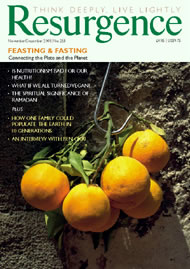Taking inspiration from John Moat’s wonderful article, Salamongundi on the annual community feast in the small village of Welcombe, North Devon we invite you to honour the idea of feasting for the next Resurgence Slow Sunday.
Think of friends whose company you enjoy, think of neighbours you’ve been meaning to invite round – but haven’t, think of family that you feel you should see more often, but don’t have the time.
The emphasis for this feast will be on simple, healthy, organic food that is also tasty, delicious and above all, inexpensive. You don’t have to spend hours slaving over a hot stove because each guest brings along a delectable dish of their own. So whether you are a small group of friends or, as with the Salamongundi feast in Welcome, a whole village, you can still come together for an afternoon of communal conviviality.
The next Resurgence Slow Sunday takes place: Sunday 30th November
The simple action: Organise a seasonal organic feast with friends and neighbours.
Simply delicious
If you’re stuck for recipe ideas, don’t worry we have some wonderful suggestions from the Schumacher College kitchens, which are standard bearers for communal eating. The recipes are taken from the book Gaia’s
Kitchen by Schumacher College chef Julia Ponsonby.
Let’s Feast for Resurgence Slow Sunday
Eat locally – think globally
Resurgence Slow Sunday is where people in their own communities perform small acts of defiance for environmentalism.
For this reason we are suggesting that all food for this feast should be local and organic. We asked The Soil Association, the UK’s leading campaigning and certification organisation for organic food and farming, to explain why this is important:
Health: Studies have shown that, on average, organic food has higher levels of iron, calcium, magnesium, phosphorous, chromium and vitamin C than non-organic food.
Communities: Organic farming is creating more jobs and revitalising rural communities; reversing the 80% decline in the UK’s agricultural workforce over the last 50 years.
Animal: No system of farming has higher levels of animal welfare standards than organic farms working to Soil Association standards.
Wildlife: Around 31,000 tonnes of chemicals are used in UK farming ever year to kill weeds, insects and other ‘pests’. In organic farming natural methods are used instead, so that wildlife can thrive.
Planet: On average organic farming uses 26% less energy per tonne of food produced – this is mainly due to the non-use of fertilisers which are the largest source of CO2 emissions in agriculture and the single largest source of nitrous oxide emissions in the world.
For more information see our Slow Sunday Slow Sunday pages.







